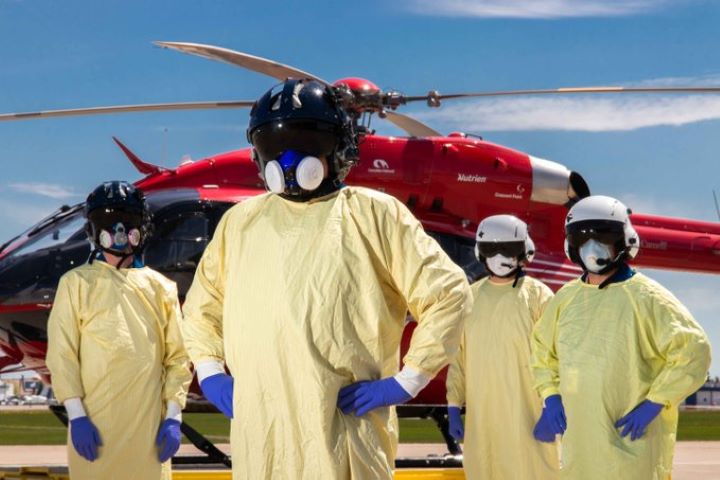As COVID-19 cases continue to rise in Alberta and other Prairie provinces, STARS air ambulance crews are also seeing an increase in the number of patients affected by the illness in need of transfer.

Dr. JN Armstrong, chief medical officer for STARS, said the number of missions across the Prairies involving patients with confirmed or suspected cases of COVID-19 has increased to about 18 per cent. That’s compared to about 13 per cent a week ago.
Typically, before the pandemic hit, about seven per cent of STARS’ overall missions were for patients with influenza-like illnesses, according to Armstrong.
“They’re concerning,” Armstrong said of the numbers, “because we know they represent a surge in COVID-19 cases. We realize that the healthcare system is under a strain and the numbers that we’re seeing just reflect that.”
Armstrong said the missions mainly involve transferring patients from rural facilities into larger cities.
“They usually have a patient that needs a higher level of care. For the most part, it’ll be intensive care unit-level care and then we’ll respond if appropriate for us to transfer the patient into the city.”
However, because of pressures being felt in intensive care units across the province, Armstrong said they’ve also been taking some patients to facilities they wouldn’t normally fly to, like Lethbridge or Red Deer “to help spread out the burden of COVID-19.”
“The intent with that is to spread out the COVID-19 patient load amongst all the ICUs in the province, not just in the big cities.”
While STARS has always had policies in place to protect staff members from infectious illnesses, Armstrong said those policies had to be revamped, reinforced and strengthened when the pandemic hit.
“It’s all about being safe and protecting our crew,” he said, adding the crews, including the pilot, wear the same gear as ICU and emergency room staff.
“They all have personal protective equipment — so N95 masks, gowns, gloves — that they use with patient contacts where any kind of infectious illness is a concern and they use these at all times while treating patients.”
Other new measures include disinfecting the helicopters after returning to base. Armstrong said at the beginning of the pandemic, the process took about an hour but crews have become more efficient over the past eight months, taking that time down to 30 to 45 minutes.
“Because COVID-19 spread, at least in large part, by contacts and droplets, we do have to decontaminate — in other words, clean out – the interior of the helicopter after every mission. That’s to protect our crew and also to protect the next patient to fly.”
- Buzz kill? Gen Z less interested in coffee than older Canadians, survey shows
- ‘She gets to be 10’: Ontario child’s heart donated to girl the same age
- Bird flu risk to humans an ‘enormous concern,’ WHO says. Here’s what to know
- Canada updating sperm donor screening criteria for men who have sex with men
Armstrong said for now, they are able to keep up with the mission volume. But he noted they’re feeling similar concerns as others in health care: added pressures if staff are forced into self-isolation.
“I do worry about the numbers going up and our crews becoming extremely busy, and there’s also concern on our part about keeping our own folks safe while all of this happens,” he said.
“We look at that information almost daily actually. Our crews also have families, many of them have children in school, have close contacts, and we do worry about our own folks having to self-isolate because of an influenza-type illness themselves or a close contact.”
Alberta reported 773 new cases of COVID-19 on Tuesday, bringing the total number of cases in the province to 40,962. Of those, 10,068 cases are active and 30,462 people have recovered.
Alberta’s death toll from COVID-19 has reached 432.
STARS serves patients in Alberta, Saskatchewan and Manitoba with bases in Calgary, Edmonton, Grande Prairie, Regina, Saskatoon and Winnipeg.



Comments